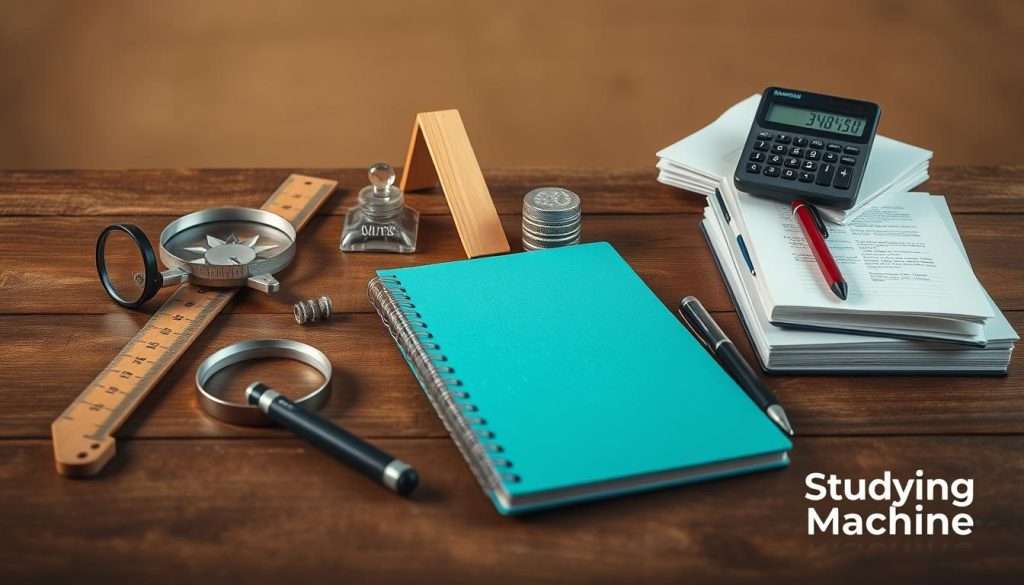Ever felt like you were missing something important? Maybe it was in a meeting, class, or just talking with someone. The truth is, how well we think often depends on our questions.
Asking the right questions is a skill you can get better at. M. Neil Browne and Stuart Keeley say in their book “Asking the Right Questions: A Guide to Critical Thinking,” good questions are key to thinking well. By improving our questioning skills, we can think more critically and make better choices.
Key Takeaways
- Understand the importance of asking the right questions in critical thinking.
- Learn techniques to improve your questioning skills.
- Discover how effective questioning can lead to more informed decision-making.
- Develop a more critical thinking approach to problem-solving.
- Enhance your ability to think more insightfully.
The Power of Questioning in Critical Thinking
Questioning is key to critical thinking. It helps us understand the world better. By asking the right questions, we find new insights, question assumptions, and make smart choices.
How Questions Shape Our Understanding
Questions do more than seek answers. They shape how we see things. Effective question formulation strategies help us grasp complex issues better. Open-ended questions invite exploration, while closed ones offer clear answers.
The Relationship Between Questions and Insights
Questions and insights go hand in hand. The right questions lead to valuable insights. These insights then guide more questions. This cycle is vital for question optimization and critical thinking.
- Identifying the core issue or problem
- Formulating questions that address this issue
- Analyzing the responses to these questions
Using these strategies boosts our critical thinking. It helps us make better decisions.
Why Most People Ask Ineffective Questions
Many people struggle with asking good questions. This is because of some common mistakes. When we ask questions, we want answers, clarity, or new ideas. But how we ask can greatly affect what we get back.
Common Questioning Pitfalls
There are traps we often fall into when asking questions. One big one is ambiguity. Vague or unclear questions can confuse more than they clarify. Another problem is making assumptions in our questions. This can push the conversation in a wrong direction, missing important details.
Also, fallacies in reasoning can mess up our questions. This includes leading questions or ones based on wrong ideas. Knowing these traps is key to developing questioning abilities that really help us learn.
By spotting these common mistakes, we can start asking better questions. This means being clear, not assuming, and making sure our questions are based on solid logic.
The Anatomy of a Great Question
What makes a question great? How can we ask questions that lead to deep conversations? Learning to craft the perfect question is a skill that grows with practice. We’ll look at what makes a question powerful and how to build them well.
Characteristics of Powerful Questions
Powerful questions share a few key traits. They are open-ended, inviting detailed thoughts and feelings. They are also clear and concise, making sure the person knows what’s being asked.
- They spark curiosity and encourage exploration.
- They don’t steer the person towards a specific answer.
- They fit the situation and the person’s interests.
Question Structure and Formulation
The way a question is structured greatly affects its impact. Starting with what, how, or why often leads to deeper answers. It’s also important to think about the timing and context of the question.
Timing and Context Considerations
Asking at the right time can greatly influence the response. Think about the person’s mood and the setting when you ask.
| Context | Question Type | Example |
|---|---|---|
| Formal Meeting | Specific, direct | “What are your thoughts on the current project?” |
| Social Gathering | Open-ended, casual | “What’s been the highlight of your week?” |
By grasping the anatomy of a great question, we can enhance our effective questioning techniques. We’ll learn to ask better questions in different settings.
How to Ask Better Questions: Core Techniques
Learning to ask good questions is a skill you can get better at with practice. Using effective question strategies in your daily talks can make you better at questioning. This helps you understand things more deeply.
The Socratic Method in Modern Context
The Socratic method is still useful today for thinking critically and exploring ideas. It involves asking questions to make ideas clearer and to encourage deep thinking. Using this method in today’s meetings or talks can make discussions more thoughtful and inquisitive.
Open vs. Closed Questions: When to Use Each
It’s important to know the difference between open and closed questions. Closed questions help you get specific answers. Open questions lead to more discussion and exploring of ideas. Choosing the right type of question depends on what you want to achieve.
Follow-up Questions That Deepen Understanding
Follow-up questions are key to understanding a topic better. Asking questions like “Can you elaborate on that?” or “How did you come to that conclusion?” can reveal more insights. This makes discussions richer and more detailed.
Getting better at asking questions takes time and effort. But by using these techniques in your daily talks, you’ll ask better questions. This will help you get valuable insights.
Overcoming Barriers to Asking Good Questions
Asking insightful questions is key, but fear, culture, and norms often hold us back. We face many obstacles when trying to seek knowledge. These barriers make it hard to develop our questioning skills.
Fear of Appearing Uninformed
One big obstacle is the fear of looking uninformed. Many people don’t ask questions because they fear being seen as less smart. As “The greatest enemy of knowledge is not ignorance, but the illusion of knowledge.” – Daniel J. Boorstin. This shows how vital it is to admit we don’t know everything and be open to learning.
Cultural and Social Obstacles
Culture and social norms also stop us from asking questions. In some places, asking questions is seen as rude or showing you don’t get it. We must recognize these issues and make places where asking questions is welcomed.
Strategies for Confidence in Questioning
So, how do we beat these barriers? First, start by asking questions in low-stakes environments, like online forums or small groups. Second, change how we think about questioning. See it as a sign of strength, not weakness. This way, we’ll grow more confident in asking insightful questions and adopt a growth mindset.
The Psychology Behind Effective Questioning
The psychology of effective questioning is complex. It involves psychological safety, emotional intelligence, and social cues. When we ask questions, we’re not just looking for information. We’re also navigating a complex web of psychological dynamics.
Creating Psychological Safety for Honest Answers
Creating a safe space for honest answers is key. When people feel comfortable and secure, they’re more likely to share their true thoughts. Effective questioning techniques involve setting the right tone and environment. For example, using open and non-judgmental language can greatly improve the quality of responses.

Reading Between the Lines: Interpreting Responses
Interpreting responses is more than just listening to the words. It’s about understanding the underlying emotions and intentions. This skill is vital for question optimization. By paying attention to non-verbal cues and the context of the response, we can gain a deeper understanding of the answer.
Managing Emotional Reactions to Questions
Managing our emotional reactions to questions is also critical. When we’re aware of our emotions and can manage them effectively, we can ask more thoughtful and considered questions. This self-awareness is a key component of effective questioning.
By understanding the psychology behind effective questioning, we can improve our communication skills and get more meaningful responses. It’s about creating a conducive environment, interpreting responses accurately, and managing our emotions.
Question Frameworks for Different Situations
Different situations need different questioning strategies. Having a few frameworks can be very helpful. Whether solving a complex problem, understanding a new concept, or making a decision, the right framework can significantly improve your questioning skills and lead to better outcomes.
The 5W1H Framework
The 5W1H method is a simple yet effective framework. It involves asking Who, What, When, Where, Why, and How. This framework is great for gathering information and understanding complex situations. By using the 5W1H framework, you can ensure you’re covering all the essential aspects of a topic and developing effective question formulation strategies.
The GROW Model for Coaching Questions
The GROW model is a powerful framework, especially useful in coaching and mentoring. GROW stands for Goal, Reality, Options, and Way forward. This model guides the questioning process to achieve specific goals. It’s a valuable tool for improving questioning skills in various situations.
The Ladder of Inference for Assumption Testing
The Ladder of Inference helps you identify and challenge your own assumptions. It involves observing data, making assumptions, and drawing conclusions. By being aware of this process, you can use questioning to test your assumptions and avoid jumping to conclusions. This enhances your critical thinking and questioning skills.
By familiarizing yourself with these frameworks and practicing their application, you can become a more effective questioner. This will help you achieve your goals more efficiently.
Developing Your Questioning Toolkit
Building a questioning toolkit is key for critical thinking and solving problems. It’s important to have a variety of questions for different situations. We’ll look at how to improve your questioning skills, including essential questions, customizing for specific contexts, and creating a personal library.
Essential Questions for Any Situation
Some questions work in many situations. These include:
- What are the key factors influencing this situation?
- How do these elements interact with each other?
- What are the potential consequences of our actions?
- What are the underlying assumptions here?
- How does this relate to our overall goals?
These essential questions help clarify things, spot issues, and guide further investigation.

Customizing Questions for Specific Contexts
While essential questions are a good start, it’s also key to tailor your questions for specific contexts. This means understanding the situation’s details and adjusting your questions. For example, in business, you might ask “What are our competitors doing?” or “Does this decision match our company values?”
Customizing your questions requires a deep understanding of the context and creative thinking. It’s about tailoring your inquiry to get the most relevant info.
Building a Personal Question Library
Creating a personal question library is an ongoing task. It involves collecting, refining, and updating your questions over time. Start by identifying useful questions from the past and add new ones as you face new situations.
Your library should grow with your experiences and insights. By regularly reviewing and updating your questions, you’ll refine your questioning skills and gain a deeper understanding of how to ask better questions.
Practical Exercises to Improve Your Questioning Skills
Let’s explore some practical exercises to boost your questioning skills. Improving at questioning requires regular practice. We’ll show you how with daily routines, group activities, and self-checks.
Daily Question Practice Routines
Begin by adding questioning to your daily life. For example, ask open-ended questions about your daily experiences, like:
- What’s the main idea behind this article?
- How does this concept relate to my life?
- What are the potential implications of this new technology?
This practice will make you better at formulating effective questions and thinking deeply about your surroundings.
Group Exercises for Better Questions
Group activities are also great for sharpening your questioning skills. Try Socratic seminars or group discussions where you ask and answer questions together. This way, you’ll learn to:
- Clarify your thoughts
- Challenge assumptions
- Explore different viewpoints
Self-Assessment: Evaluating Your Question Quality
To check your question quality, ask yourself:
- Is my question clear and concise?
- Does it encourage discussion or provide a simple answer?
- Am I asking the right questions to achieve my goals?
Regularly checking your questioning skills will help you spot areas to improve. This way, you’ll develop more effective questioning techniques.
By making these exercises a part of your daily routine, you’ll see big improvements in your questioning and critical thinking abilities.
Conclusion: Transforming Your Thinking Through Better Questions
Asking the right questions is key for critical thinking and making good decisions. By using the tips from this guide, you’ll get better at asking smart questions.
When you start asking insightful questions, you’ll see how much better you can solve complex problems. This will help you make informed choices. You’ll become more confident in tackling challenges.
The skill of question optimization keeps getting better with time. It needs patience, persistence, and a desire to learn. By following the advice in this guide, you’ll improve your questioning skills. This will help you in both your personal and work life.
Now, it’s your turn to try these strategies. See how better questioning can change your life!

